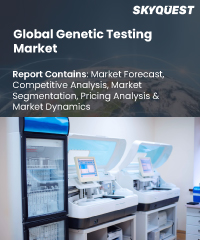
Product ID: SQMIG35H2074

Report ID:
SQMIG35H2074 |
Region:
Global |
Published Date: February, 2024
Pages:
157
|
Tables:
94 |
Figures:
76
Genetic Testing Market size was valued at USD 6082.85 million in 2019 and is poised to grow from USD 7421.08 million in 2023 to USD 35.34 million by 2031, growing at a CAGR of 22% in the forecast period (2024-2031).
Genetic testing is a type of medical examination that examines a person's DNA to detect genetic variations in certain disorders. A suspected genetic disease can be confirmed by its findings. It helps determine a person's having or developing a genetic condition. It involves monitoring proteins, chromosomes, and genes for changes. Genetic variations (mutations) that increase the risk of a genetic disorder can be detected by gene testing. It is voluntary and offers benefits, as well as restrictions and risks. It involves dissecting tissue or cells to look for changes in genes, chromosomes, or proteins. In addition, tumor tissue can be used to diagnose cancer.
The development of new test kits as a result of technological advancements and the increased prevalence of genetic and chronic diseases are the two main factors driving the global market. Increasing public awareness about the availability of advanced diagnostic procedures has increased the need for genetic testing. Additionally, the growing geriatric population is expected to fuel market growth in the near future. The United Nations estimates that in 2019 there were 382 million individuals worldwide who were 60 years of age or older, and this figure is expected to increase to 2.1 billion by 2031. Because of the increased risk of chronic diseases in older individuals, genetic testing may be more important. Rising consumer healthcare expenditure, increasing disposable income, technological development, and availability of these services are the major factors driving the growth of the global genetic testing market.
The adoption of genetic testing among populations around the world is being fueled by increasing government efforts to increase knowledge about it. In addition, the presence of several key market players and their significant investment in R&D activities has led to product design innovation, improved delivery, and increased product quality. Owing to their low cost, direct-to-consumer genetic testing kits are increasingly being used by the general public, which is expected to accelerate the growth of the global market. In addition, people can purchase DNA test kits from major Internet retailers such as Ancestry.com and 23andMe to have them delivered to their homes. People are increasingly using self-testing websites due to the ease and convenience of self-testing kits. Additionally, increasing marketing strategies used by online businesses have contributed greatly to increasing knowledge about genetic testing. For example, in 2019, Ancestry.com spent US$109.0 million on TV advertising in the US. these ads had a huge impact on the global market.
However, it can be expensive and may not be covered by some health insurance plans. Stringent regulation policies related to the testing are the factors that may hamper the market growth.
US Genetic Testing Market is poised to grow at a sustainable CAGR for the next forecast year.
Our industry expert will work with you to provide you with customized data in a short amount of time.
REQUEST FREE CUSTOMIZATIONGenetic Testing Market size was valued at USD 6082.85 million in 2019 and is poised to grow from USD 7421.08 million in 2023 to USD 35.34 million by 2031, growing at a CAGR of 22% in the forecast period (2024-2031).
Want to customize this report? This report can be personalized according to your needs. Our analysts and industry experts will work directly with you to understand your requirements and provide you with customized data in a short amount of time. We offer $1000 worth of FREE customization at the time of purchase.

Product ID: SQMIG35H2074